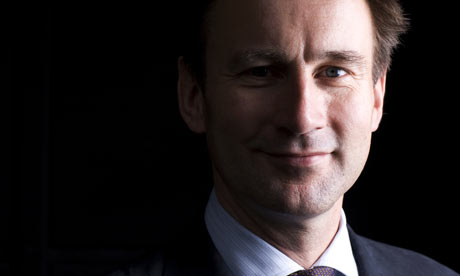
The digital economy bill (DEB) looks set to become law after the Conservative shadow culture secretary, Jeremy Hunt, today gave the controversial legislation his reluctant support during its second reading in the Commons.
However, Hunt also said during the DEB debate that if a Tory government is formed after the 6 May general election it would drop any "flawed" legislation.
If the DEB is voted through the Commons late tonight, the wide-ranging legislation, which includes controversial measures that could see the internet connections of illegal filesharers suspended or copyright-infringing websites blocked, will head to the last minute "wash-up" period of fast-track negotiations before parliament is dissolved later this week.
Hunt said that the Tories would remove clauses giving the media regulator, Ofcom, more power, ditch plans to replace ITV's regional news bulletins with independently produced alternatives, and current provisions on orphan works and extension of licensing.
However, he categorically guaranteed that Channel 4 would not be privatised under a Conservative government and, reluctantly, that controversial anti-piracy measures would be backed because to block them would cause too much damage to the creative industries.
"[The digital economy bill] could have been massively improved if there had been more scrutiny at the committee stage … why is it debate on such a critically important bill has been left to the last minute?" Hunt asked MPs during today's debate. "There are parts of the bill that we will reluctantly let through. Digital piracy is a very real problem for our creative industries ... We do accept that action needs to be taken to ensure the internet is a functioning marketplace and that copyright infringers do not get away with their actions scot free."
Hunt added that if the Conservatives win the election they would use "every parliamentary means at our disposal" to remove clauses if legislation turns out to be "flawed" or have major "unintended consequences". He argued that there would be time before proposals, such as anti-piracy measures, had to be put in place to make sure there are "proper safeguards" in place.
"These measures are so critical for 2 million jobs for people in the digital and creative industries that if they [the clauses] are completely deleted or removed there would be an economic cost," he said.
While the government holds a significant voting majority, Conservative support has been seen as crucial because the fast-track wash-up process of negotiations only deals with unopposed legislation.
Harriet Harman, the leader of the Commons, opened the DEB debate this afternoon by seeking to address mounting criticism that controversial clauses in the bill have not been given enough debating time.
Harman said that after the general election a "super affirmative" process, which includes a full public consultation, would be undertaken to address any issues before the bill passes into law.
The culture secretary, Ben Bradshaw, added: "If [the digital economy bill] gets on to the statute books it will be with the co-operation of the opposition party and hopefully the Liberal Democrats and others too. Most of the bill enjoys good cross-party support. It is not true, as some have claimed, that the provisions of this bill have not been subject to considerable discussions."
Critics of the bill, which include the Open Rights Group, the Liberal Democrats and internet service providers, argue that legislation of such importance is not being enough time to be properly scrutinised and have called for it to be re-introduced in the next parliament.
"This bill is the victim of one of the worst lobbying scandals of this parliament," said Jim Killock, executive director of the Open Rights Group. "Parliamentary scrutiny must be applied. Over 20,000 voters have written to MPs and raised funds for adverts, because we know disconnection of families for allegations of copyright infringement is a draconian punishment, and need to be fully debated, not rammed through at the last minute."
• To contact the MediaGuardian news desk email editor@mediatheguardian.com or phone 020 3353 3857. For all other inquiries please call the main Guardian switchboard on 020 3353 2000.
• If you are writing a comment for publication, please mark clearly "for publication".

